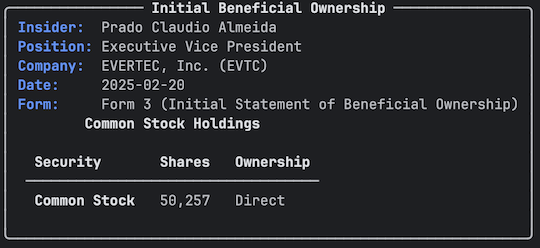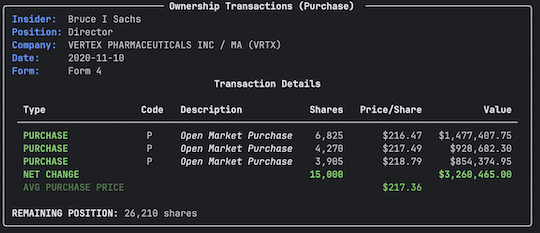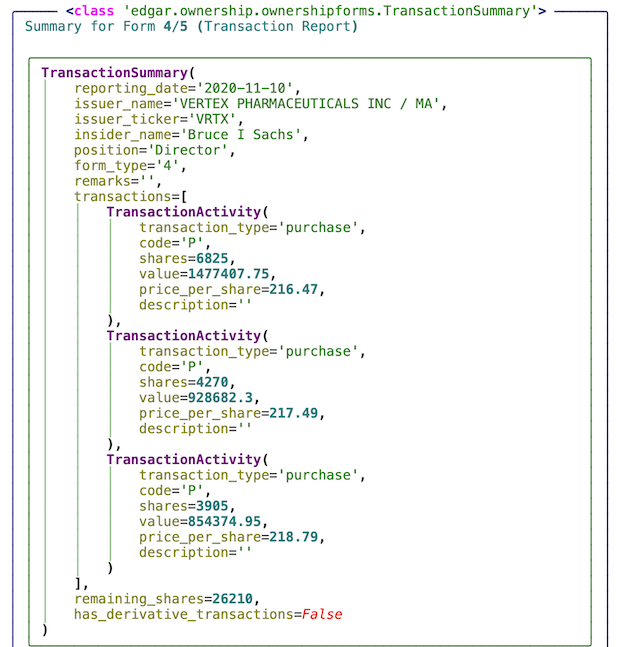Insider Filings
Insider filings are reports filed by company insiders (such as officers, directors, and employees) when they buy or sell shares in their own companies.
There are several types of insider filings that investors should be aware of:
- Form 3: Filed by insiders to report their initial ownership of company stock - typically filed when an insider joins a company or becomes an officer or director.
- Form 4: Filed to report any changes in ownership of company stock - typically filed when an insider buys or sells company stock.
- Form 5: Includes any transactions that were not reported on Form 4 - typically filed at the end of the fiscal year.
Getting Insider Filings
You can access insider filings using the get_filings method of the Company class.
c = Company("VRTX")
filings = c.get_filings(form=[3,4,5])
You can use either the string or numeric value for the form e.g. "3" or 3.
filings = c.get_filings(form=4)
If you are more interested in insider filings non-specific to a particular company, you can use the get_insider_filings method of the Filing class.
filings = get_filings(form=[3,4,5])
The Ownership data object
The Ownership object is a data object that represents the basic information contained in an insider filing. It is created by parsing the
XML attachment with the data about the insider transactions in the filing.
The Ownership is subclassed into Form3, Form4, and Form5 objects that contain additional information specific to the type of filing.
So if you have a Form 3 filing you can convert the Ownership object to a Form3 object to get the additional information.
form3 = filing.obj()
Converting Ownership to a dataframe
You can convert the Ownership object to a pandas dataframe using the to_dataframe() method.
df = form4.to_dataframe()

By default this will show each of the trades made in that filing. If you want to see the aggregated summary of the trades you can set detailed=False
df = form4.to_dataframe(detailed=False)

By default the dataframe will include metadata about the filing. If you want to exclude the metadata you can set include_metadata=False
df = form4.to_dataframe(include_metadata=False)

The specifics of the data in the dataframe will depend on the type of filing and the information contained in the filing.
Form 3 - Initial Beneficial Ownership
The Form3 data object is created from a form 3 filing as follows
form3 = filing.obj()

Form 4 - Changes in Beneficial Ownership
In November 2020 Bruce Sachs, an independent director of Vertex Pharmaceuticals, filed a Form 4 to report the purchase of 15,000 shares of Vertex Pharmaceuticals (VRTX) at an average price of $217.36 per share.

The filing object shows basic information but none of the details of the transaction.
To get the details of the transaction you can use the obj() method to convert the filing to a Form4 object.
form4 = filing.obj()

The form 4 shows the individual transactions that make up the total transaction. In this case, the total transaction was the purchase of 15,000 shares of Vertex Pharmaceuticals.
Additional information about the transaction can be found in the TransactionSummary object.
ownership_summary = form4.get_ownership_summary()

Form 5 - Annual Changes in Beneficial Ownership
Form 5 filings are essentially the same as Form 4 filings but are filed at the end of the fiscal year to report any transactions that were not reported on Form 4. So the data in a Form 5 filing will be similar to that in a Form 4 filing.
Ownership Summary
The Ownership object has a get_ownership_summary() method that returns either an InitialOwnershipSummary for Form 3 filings or a TransactionSummary object for Forms 4 and 5. These object contain more specific details about the ownership filing.
ownership_summary = form4.get_ownership_summary()
Initial Ownership Summary
The InitialOwnershipSummary object contains the following fields:
total_shares- the total number of shares owned by the insiderhas_derivatives- a boolean indicating whether the insider owns any derivativesno_securities- a boolean indicating whether the insider owns any securitiesholdings: List[SecurityHolding] - a list of SecurityHolding objects representing the insider's holdings
The SecurityHolding object is defined as follows:
@dataclass
class SecurityHolding:
"""Represents a security holding (for Form 3)"""
security_type: str # "non-derivative" or "derivative"
security_title: str
shares: int
direct_ownership: bool
ownership_nature: str = ""
underlying_security: str = ""
underlying_shares: int = 0
exercise_price: Optional[float] = None
exercise_date: str = ""
expiration_date: str = ""
SecurityHolding also has these properties
ownership_description- a human-readable description of the type of ownership "Direct/Indirect"is_derivative- a boolean indicating whether the holding is a derivative
Transaction Summary
The TransactionSummary object is defined as follows:
@dataclass
class TransactionActivity:
"""Represents a specific transaction activity type"""
transaction_type: str
code: str
shares: Any = 0 # Handle footnote references
value: Any = 0
price_per_share: Any = None # Add explicit price per share field
description: str = ""
It also has these properties as a convenience in case any of the expected numeric values are not in fact numeric.
shares_numeric- the number of shares involved in the transactionvalue_numeric- the value of the transactionprice_numeric- the price per share of the transaction